‘You think so?’ Droshny glanced up sombrely at the dam. ‘And just what do you think is going to happen to us all down here if that goes?’
Slowly, soundlessly and almost invisibly, Mallory and Miller swam northwards through the dark waters of the Neretva dam, away from the direction of the dam wall. Suddenly Miller, who was slightly in the lead, gave a low exclamation and stopped swimming.
‘What’s up?’ Mallory asked.
‘This is up.’ With an effort Miller lifted a section of what appeared to be a heavy wire cable just clear of the water. ‘Nobody mentioned this little lot.’
‘Nobody did,’ Mallory agreed. He reached under the water. ‘And there’s a steel mesh below.’
‘An anti-torpedo net?’
‘Just that.’
‘Why?’ Miller gestured to the north where, at a distance of less than two hundred yards, the dam made an abrupt right-angled turn between the towering cliff-faces. ‘It’s impossible for any torpedo bomber – any bomber – to get a run-in on the dam wall.’
‘Someone should have told the Germans. They take no chances – and it makes things a damned sight more difficult for us.’ He peered at his watch. ‘We’d better start hurrying. We’re late.’
They eased themselves over the wire and started swimming again, more quickly this time. Several minutes later, just after they had rounded the corner of the dam and lost sight of the dam wall, Mallory touched Miller on the shoulder. Both men trod water, turned and looked back in the direction from which they had come. To the south, not much more than two miles away, the night sky had suddenly blossomed into an incandescent and multi-coloured beauty as scores of parachute flares, red and green and white and orange, drifted slowly down towards the Neretva river.
“Very pretty, indeed,’ Miller conceded. ‘And what’s all this in aid of?’
‘It’s in aid of us. Two reasons. First of all, it will take any person who looks at that – and everyone will look at it – at least ten minutes to recover his night-sight, which means that any odd goings-on in this part of the dam are all that less likely to be observed: and if everyone is going to be busy looking that way, then they can’t be busy looking this way at the same time.’
‘Very logical,’ Miller approved. ‘Our Captain Jensen doesn’t miss out on very much, does he?’
‘He has, as the saying goes, all his marbles about him.’ Mallory turned again and gazed to the east, his head cocked the better to listen. He said: ‘You have to hand it to them. Dead on target, dead on schedule. I hear him coming now.’
The Lancaster, no more than five hundred feet above the surface of the dam, came in from the east, its engine throttled back almost to stalling speed. It was still two hundred yards short of where Mallory and Miller were treading water when suddenly huge black silk parachutes bloomed beneath it: almost simultaneously, engine-power was increased to maximum revolutions and the big bomber went into a steeply banking climbing turn to avoid smashing into the mountains on the far side of the dam.
Miller gazed at the slowly descending black parachutes, turned, and looked at the brilliantly burning flares to the south. ‘The skies,’ he announced, ‘are full of things tonight.’
He and Mallory began to swim in the direction of the falling parachutes.
Petar was near to exhaustion. For long minutes now he had been holding Groves’s dead weight pinned against the iron ladder and his aching arms were beginning to quiver with the strain. His teeth were clenched hard, his face, down which rivulets of sweat poured, was twisted with the effort and the agony of it all. Plainly, Petar could not hold out much longer.
It was by the light of those flares that Reynolds, still crouched with Maria in hiding behind the big boulder, first saw the predicament of Petar and Groves. He turned to glance at Maria: one look at the stricken face was enough to tell Reynolds that she had seen it, too.
Reynolds said hoarsely: ‘Stay here. I must go and help them.’
‘No!’ She caught his arm, clearly exerting all her will to keep herself under control: her eyes, as they had been when Reynolds had first seen her, had the look of a hunted animal about them. ‘Please, Sergeant, no. You must stay here.’
Reynolds said desperately: ‘Your brother–’
‘There are more important things–’
‘Not for you there aren’t.’ Reynolds made to rise, but she clung to his arm with surprising strength, so that he couldn’t release himself without hurting her. He said, almost gently: ‘Come on, lass, let me go.’
‘No! If Droshny and his men get across–’ She broke off as the last of the flares finally fizzled to extinction, casting the entire gorge into what was, by momentary contrast, an almost total darkness. Maria went on simply: ‘You’ll have to stay now, won’t you?’
‘I’ll have to stay now.’ Reynolds moved out from the shelter of the boulder and put his night-glasses to his eyes. The swing bridge, and as far as he could tell, the far bank seemed innocent of any sign of life. He traversed up the gully and could just make out the form of Andrea, his excavations finished, resting peacefully behind the big boulder. Again with a feeling of deep unease, Reynolds trained his glasses on the bridge. He suddenly became very still. He removed the glasses, wiped the lenses very carefully, rubbed his eyes and lifted the glasses again.
His night-sight, momentarily destroyed by the flares, was now almost back to normal and there could be no doubt or any imagination about what he was seeing – seven or eight men, Droshny in the lead, flat on their stomachs, were inching their way on elbows, hands and knees across the wooden slats of the swing bridge.
Reynolds lowered the glasses, stood upright, armed a grenade and threw it as far as he could towards the bridge. It exploded just as it landed, at least forty yards short of the bridge. That it achieved nothing but a flat explosive bang and the harmless scattering of some shale was of no account, for it had never been intended to reach the bridge: it had been intended as a signal for Andrea, and Andrea wasted no time.
He placed the soles of both feet against the boulder, braced his back against the cliff-face and heaved. The boulder moved the merest fraction of an inch. Andrea momentarily relaxed, allowing the boulder to roll back, then repeated the process: this time the forward motion of the boulder was quite perceptible. Andrea relaxed again, then pushed for the third time.
Down below on the bridge, Droshny and his men, uncertain as to the exact significance of the exploding grenade, had frozen into complete immobility. Only their eyes moved, darting almost desperately from side to side to locate the source of a danger that lay so heavily in the air as to be almost palpable.
The boulder was distinctly rocking now. With every additional heave it received from Andrea, it was rocking an additional inch farther forward, an additional inch farther backwards. Andrea had slipped farther and farther down until now he was almost horizontal on his back. He was gasping for breath and sweat was streaming down his face. The boulder rolled back almost as if it were going to fall upon him and crush him. Andrea took a deep breath, then convulsively straightened back and legs in one last titanic heave. For a moment the boulder teetered on the point of imbalance, reached the point of no return and fell away.
Droshny could most certainly have heard nothing and, in that near darkness, it was certain as could be that he had seen nothing. It could only have been an instinctive awareness of impending death that made him glance upwards in sudden conviction that this was where the danger lay. The huge boulder, just rolling gently when Droshny’s horror-stricken eyes first caught sight of it, almost at once began to bound in ever-increasing leaps, hurtling down the slope directly towards them, trailing a small avalanche behind it. Droshny screamed a warning. He and his men scrambled desperately to their feet, an instinctive reaction that was no more than a useless and token gesture in the face of death, because, for most of them, it was already far too late and they had no place to go.
Читать дальше
Конец ознакомительного отрывка
Купить книгу











